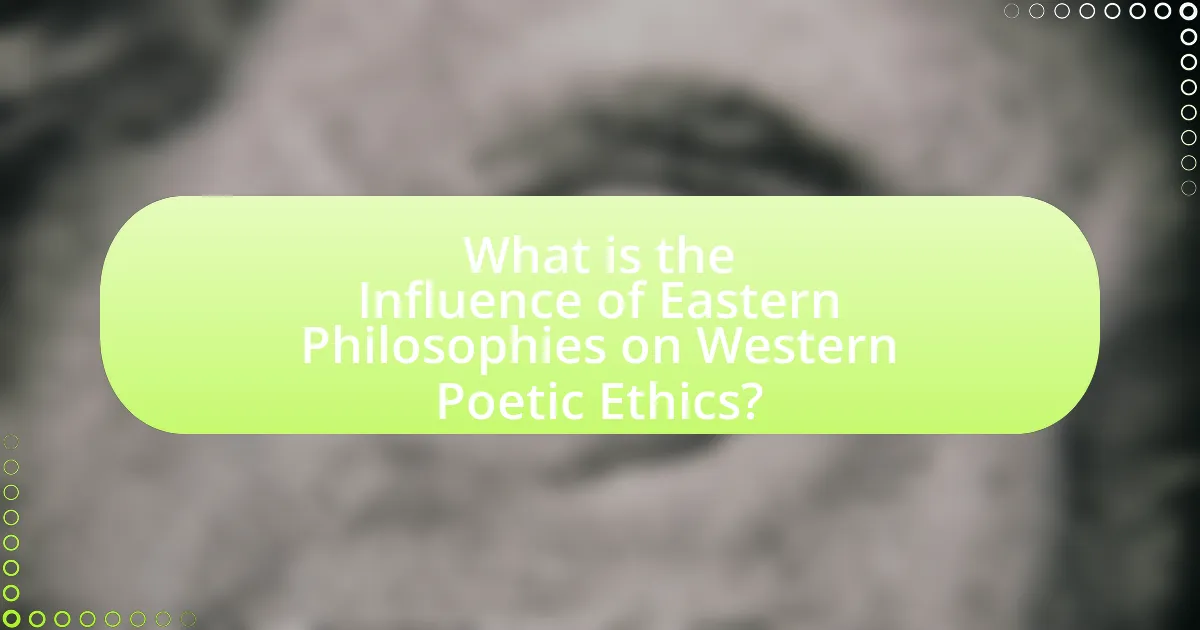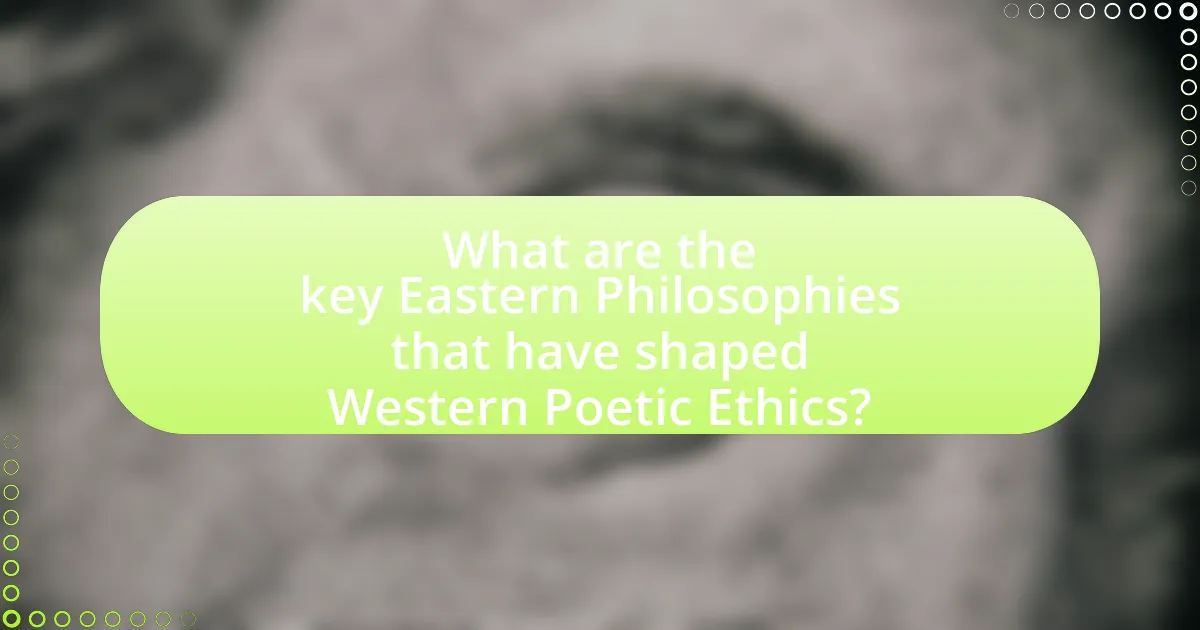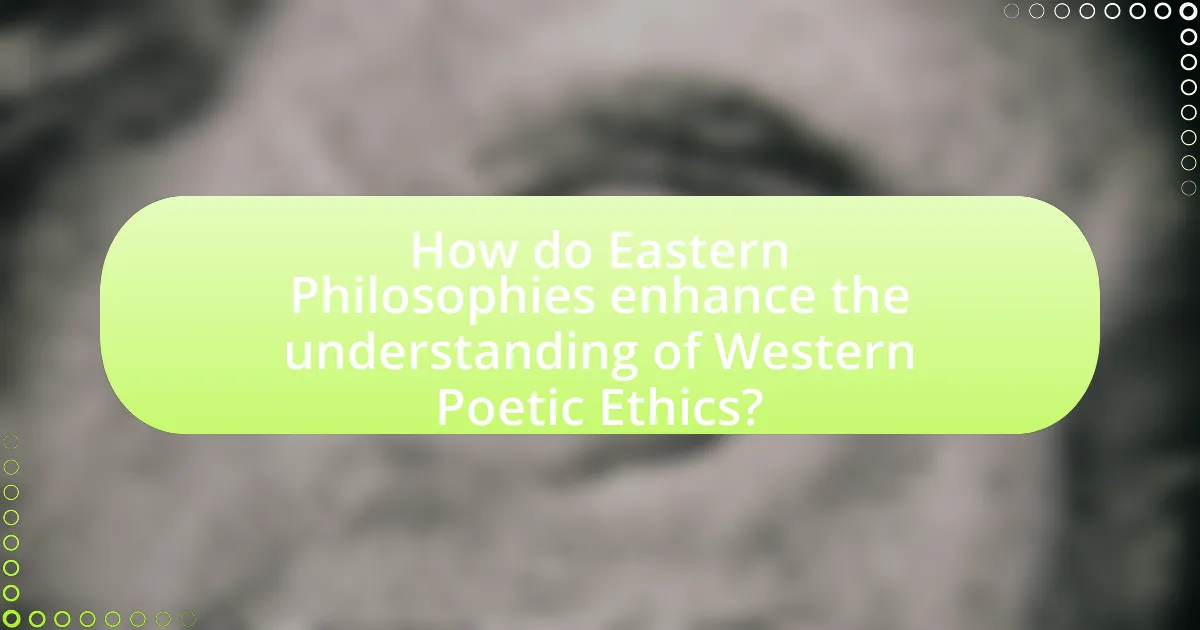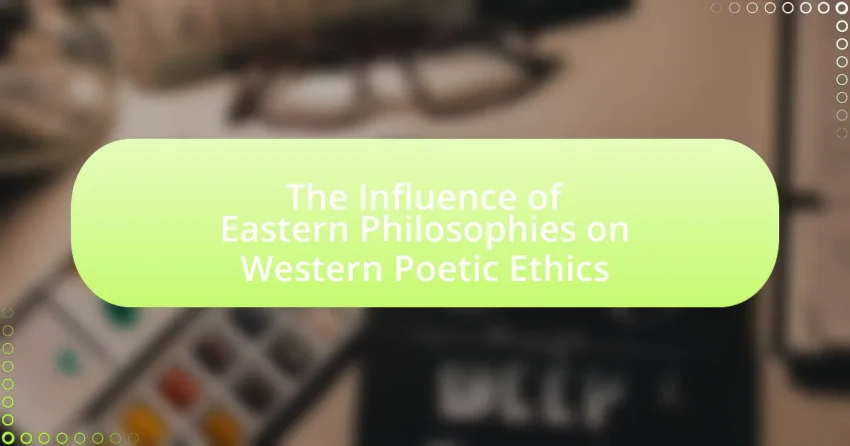The article examines the influence of Eastern philosophies, particularly Buddhism and Taoism, on Western poetic ethics. It highlights how these philosophies introduce concepts such as interconnectedness, mindfulness, and the moral responsibility towards nature and humanity, which have been reflected in the works of poets like Walt Whitman and Gary Snyder. The discussion includes historical impacts, specific philosophical frameworks, and the ethical dilemmas addressed through these influences, emphasizing the integration of Eastern thought into Western poetry and its implications for contemporary poetic expression. Additionally, it explores practical techniques for poets to incorporate these philosophies into their work, enhancing thematic depth and emotional resonance.

What is the Influence of Eastern Philosophies on Western Poetic Ethics?
Eastern philosophies, particularly Buddhism and Taoism, have significantly influenced Western poetic ethics by introducing concepts such as interconnectedness, mindfulness, and the importance of nature. These philosophies emphasize the moral responsibility of individuals towards others and the environment, which has been reflected in the works of Western poets like Walt Whitman and Gary Snyder. For instance, Whitman’s poetry often embodies the idea of unity with nature and humanity, mirroring the Eastern belief in the oneness of existence. Additionally, Snyder’s work explicitly draws from Zen principles, advocating for a harmonious relationship with the natural world. This cross-pollination has enriched Western poetic ethics, fostering a deeper appreciation for the moral implications of human actions within a broader ecological context.
How have Eastern philosophies historically impacted Western poetic traditions?
Eastern philosophies have historically impacted Western poetic traditions by introducing concepts such as nature, spirituality, and the interconnectedness of existence. For instance, the influence of Taoism and Zen Buddhism can be seen in the works of poets like Ezra Pound and William Butler Yeats, who incorporated Eastern themes of simplicity and the natural world into their poetry. The translation of classical Chinese poetry, particularly the works of Li Bai and Du Fu, during the 19th century further facilitated this exchange, leading to a blending of Eastern imagery and philosophical ideas with Western poetic forms. This cross-cultural interaction enriched Western literature, allowing for a more profound exploration of existential themes and a shift towards a more contemplative and introspective style in poetry.
What specific Eastern philosophies have influenced Western poetry?
Buddhism and Taoism are specific Eastern philosophies that have significantly influenced Western poetry. The incorporation of Buddhist concepts, such as mindfulness and impermanence, can be seen in the works of poets like Gary Snyder and Jack Kerouac, who embraced Zen principles in their writing. Taoism, with its emphasis on nature and the interconnectedness of all things, has inspired poets such as Ezra Pound and William Carlos Williams, who often reflected Taoist ideas in their exploration of the natural world. These influences demonstrate a blending of Eastern thought with Western poetic traditions, enriching the thematic depth and stylistic diversity of Western poetry.
How did cultural exchanges facilitate this influence?
Cultural exchanges facilitated the influence of Eastern philosophies on Western poetic ethics by enabling the transmission of ideas, practices, and artistic expressions between diverse cultures. For instance, the Silk Road served as a critical conduit for the exchange of texts and philosophies, allowing Western poets to access Eastern concepts such as Taoism and Buddhism, which emphasize harmony, nature, and introspection. This interaction led to the incorporation of Eastern themes and ethical considerations into Western poetry, as seen in the works of poets like Ezra Pound and T.S. Eliot, who drew inspiration from Eastern texts. The cross-cultural dialogue not only enriched Western poetic forms but also encouraged a broader understanding of ethics that transcended geographical boundaries.
Why is the study of this influence important in understanding poetic ethics?
The study of the influence of Eastern philosophies on Western poetic ethics is important because it reveals how cross-cultural exchanges shape moral frameworks in literature. This influence highlights the integration of concepts such as harmony, balance, and interconnectedness, which are prevalent in Eastern thought, into Western poetic traditions. For instance, the incorporation of Taoist principles in the works of poets like Ezra Pound demonstrates a blending of ethical perspectives that enriches the understanding of poetic expression. By examining these interactions, scholars can better appreciate the complexities of ethical considerations in poetry, illustrating how diverse philosophical backgrounds contribute to the evolution of literary ethics.
What ethical frameworks are derived from Eastern philosophies?
Eastern philosophies give rise to several ethical frameworks, notably Confucianism, Taoism, and Buddhism. Confucianism emphasizes moral virtues such as filial piety, humaneness, and righteousness, advocating for social harmony and proper conduct in relationships. Taoism promotes living in accordance with the Tao, or the natural way, encouraging simplicity, humility, and compassion. Buddhism introduces the concept of the Four Noble Truths and the Eightfold Path, focusing on alleviating suffering through ethical conduct, mental discipline, and wisdom. These frameworks have significantly influenced ethical thought and practices in various cultures, shaping moral perspectives and behaviors.
How do these frameworks compare to Western poetic ethics?
Eastern philosophical frameworks, such as Confucianism and Taoism, emphasize harmony, moral integrity, and the interconnectedness of all beings, contrasting with Western poetic ethics that often prioritize individualism and personal expression. For instance, Confucianism advocates for social responsibility and ethical relationships, which can be seen in the works of poets like Li Bai, while Western poets like Walt Whitman focus on the self and personal experience. This divergence highlights how Eastern frameworks promote collective well-being and moral duty, whereas Western ethics often celebrate individual creativity and freedom.

What are the key Eastern Philosophies that have shaped Western Poetic Ethics?
Key Eastern philosophies that have shaped Western poetic ethics include Buddhism, Confucianism, and Taoism. Buddhism emphasizes compassion and the interconnectedness of all beings, influencing Western poets to explore themes of empathy and moral responsibility. Confucianism, with its focus on moral integrity and social harmony, has encouraged Western poets to reflect on ethical relationships and societal duties. Taoism promotes the idea of naturalness and spontaneity, inspiring Western poetic expressions that value authenticity and the beauty of the natural world. These philosophies have provided foundational ethical frameworks that resonate within Western poetic traditions, fostering a deeper exploration of moral and existential themes.
What role does Buddhism play in Western poetic ethics?
Buddhism significantly influences Western poetic ethics by introducing concepts such as mindfulness, compassion, and the impermanence of life. These principles encourage poets to explore themes of interconnectedness and the human experience, fostering a deeper emotional resonance in their work. For instance, poets like Gary Snyder and Allen Ginsberg have incorporated Buddhist ideas into their writings, emphasizing the importance of awareness and the transient nature of existence. This integration of Buddhist thought into Western poetry not only enriches the ethical framework of the art form but also promotes a more profound understanding of the self and the world, as seen in the reflective and often meditative quality of their verses.
How do Buddhist concepts of suffering and enlightenment manifest in poetry?
Buddhist concepts of suffering and enlightenment manifest in poetry through themes of impermanence, mindfulness, and the quest for inner peace. Poets often explore the nature of suffering as a universal experience, reflecting on the transient nature of life and the emotional turmoil that accompanies it. For instance, the concept of “dukkha,” or suffering, is frequently depicted in works that emphasize the inevitability of pain and loss, encouraging readers to confront these realities.
Additionally, the pursuit of enlightenment is illustrated in poetry through imagery and metaphors that evoke moments of clarity and awakening. Poets may use nature as a symbol of enlightenment, portraying serene landscapes that represent inner tranquility and the realization of interconnectedness. This is evident in the works of poets influenced by Buddhism, such as Gary Snyder, who integrates Buddhist philosophy into his exploration of nature and existence.
The interplay between suffering and enlightenment in poetry serves to guide readers toward a deeper understanding of their own experiences, promoting a sense of acceptance and mindfulness. This alignment with Buddhist teachings enhances the emotional depth and philosophical richness of poetic expression, making it a powerful medium for conveying these profound concepts.
What are examples of Western poets influenced by Buddhist thought?
Examples of Western poets influenced by Buddhist thought include Gary Snyder, Allen Ginsberg, and Jack Kerouac. Gary Snyder’s poetry often reflects Buddhist themes of nature and mindfulness, as seen in his collection “Turtle Island,” which won the Pulitzer Prize in 1975. Allen Ginsberg, a key figure in the Beat Generation, incorporated Buddhist concepts in works like “Howl” and “The Dharma Bums,” where he explores the nature of existence and consciousness. Jack Kerouac’s novel “The Dharma Bums” explicitly discusses Buddhist philosophy and its impact on his worldview, showcasing the integration of Eastern thought into Western literary traditions.
How does Taoism contribute to the ethical dimensions of Western poetry?
Taoism contributes to the ethical dimensions of Western poetry by emphasizing harmony, balance, and the interconnectedness of all things. This philosophical framework encourages poets to explore themes of nature, simplicity, and the importance of living in accordance with the natural order, which can be seen in the works of poets like Walt Whitman and Gary Snyder. For instance, Whitman’s celebration of the self and the universe reflects Taoist principles of unity and the flow of life, while Snyder’s poetry often incorporates Taoist imagery and concepts, promoting ecological awareness and a sense of responsibility towards nature. These influences illustrate how Taoism enriches the ethical landscape of Western poetry by advocating for a deeper understanding of humanity’s relationship with the world.
What Taoist principles resonate with Western poetic themes?
Taoist principles such as harmony with nature, the concept of wu wei (effortless action), and the importance of simplicity resonate with Western poetic themes. These principles emphasize a deep connection to the natural world, which is a prevalent theme in Western poetry, particularly in the works of poets like William Wordsworth and John Keats, who celebrate nature’s beauty and its influence on human emotion. The idea of wu wei aligns with the Western poetic exploration of spontaneity and authenticity, as seen in the Romantic movement, where poets sought to express genuine feelings without forced structure. Additionally, the Taoist value of simplicity is mirrored in the minimalist aesthetics found in modern Western poetry, where clarity and directness are often prioritized. These connections illustrate how Taoist thought has influenced Western poetic expression, enriching its thematic depth and emotional resonance.
How have Western poets interpreted Taoist ideas in their works?
Western poets have interpreted Taoist ideas by emphasizing themes of nature, simplicity, and the interconnectedness of all things. For instance, poets like Ezra Pound and Gary Snyder have drawn from Taoist concepts to explore the harmony between humanity and the natural world, reflecting the Taoist belief in living in accordance with the Tao, or the natural way. Additionally, the influence of Laozi’s “Tao Te Ching” can be seen in the works of poets who advocate for a minimalist approach to life and art, mirroring the Taoist principle of wu wei, or effortless action. This interpretation is evident in Snyder’s poetry, where he often integrates ecological awareness and a sense of spiritual unity with nature, aligning with Taoist philosophy.

How do Eastern Philosophies enhance the understanding of Western Poetic Ethics?
Eastern philosophies enhance the understanding of Western poetic ethics by introducing concepts such as interconnectedness, balance, and the moral implications of human actions. These philosophies, particularly Buddhism and Taoism, emphasize the importance of harmony with nature and the ethical dimensions of personal conduct, which can deepen the moral considerations in Western poetry. For instance, the Buddhist principle of compassion encourages poets to explore themes of empathy and social responsibility, while Taoist ideas of balance can inspire a more holistic approach to ethical dilemmas in poetic narratives. This integration of Eastern thought into Western poetic ethics fosters a richer dialogue about morality, encouraging poets to reflect on the broader implications of their work in relation to both individual and collective human experiences.
What ethical dilemmas in poetry are addressed through Eastern philosophies?
Eastern philosophies address ethical dilemmas in poetry primarily through concepts such as non-attachment, the nature of suffering, and the interconnectedness of all beings. For instance, Buddhist teachings emphasize the importance of compassion and mindfulness, which challenge poets to consider the impact of their words on others and the broader world. Additionally, Confucianism highlights the significance of moral integrity and social responsibility, prompting poets to reflect on their roles within society and the ethical implications of their artistic expressions. These philosophical frameworks encourage poets to navigate complex moral landscapes, balancing personal expression with communal harmony and ethical considerations.
How do Eastern philosophies provide solutions to these dilemmas?
Eastern philosophies provide solutions to dilemmas by emphasizing concepts such as interconnectedness, mindfulness, and the pursuit of harmony. For instance, Buddhism teaches the principle of non-attachment, which helps individuals navigate personal and societal conflicts by reducing desires that lead to suffering. Additionally, Confucianism promotes ethical relationships and social harmony, guiding individuals to act with integrity and responsibility towards others. These philosophies encourage introspection and a holistic view of life, fostering resilience and adaptability in the face of challenges. Historical practices, such as meditation in Zen Buddhism, have been shown to enhance emotional regulation and clarity, further supporting individuals in resolving dilemmas effectively.
What are the implications of these solutions for contemporary poetry?
The implications of solutions derived from Eastern philosophies for contemporary poetry include a shift towards introspection, mindfulness, and interconnectedness in poetic expression. These philosophies encourage poets to explore themes of unity and the human experience, fostering a deeper emotional resonance with readers. For instance, the incorporation of Zen principles promotes simplicity and clarity, leading to more impactful imagery and language in poetry. Additionally, the emphasis on non-duality found in Eastern thought challenges traditional Western poetic binaries, allowing for a more fluid exploration of identity and existence. This integration of Eastern ethics into Western poetry not only enriches the thematic depth but also broadens the stylistic approaches available to contemporary poets, ultimately enhancing the overall landscape of modern poetic discourse.
How can poets integrate Eastern philosophical concepts into their work?
Poets can integrate Eastern philosophical concepts into their work by incorporating themes such as interconnectedness, impermanence, and mindfulness. For instance, poets can explore the idea of interconnectedness, which is central to Buddhism and Taoism, by illustrating the relationships between nature, humanity, and the cosmos in their verses. Additionally, the concept of impermanence, a key aspect of Buddhist thought, can be reflected in poetry that emphasizes the transient nature of life and emotions, allowing readers to appreciate the beauty in fleeting moments. Mindfulness, rooted in Eastern practices, can be woven into poetic language that encourages readers to engage fully with the present moment, enhancing their emotional and sensory experiences. These integrations not only enrich the poetic narrative but also resonate with the ethical dimensions of Eastern philosophies, fostering a deeper understanding of existence and human experience.
What practical techniques can poets use to reflect these philosophies?
Poets can use techniques such as imagery, metaphor, and juxtaposition to reflect Eastern philosophies in their work. Imagery allows poets to create vivid sensory experiences that evoke the interconnectedness of nature and humanity, a key aspect of philosophies like Taoism. Metaphor can illustrate complex ideas, such as the concept of impermanence found in Buddhism, by comparing fleeting moments to natural phenomena. Juxtaposition enables poets to contrast opposing ideas, reflecting the duality present in many Eastern philosophies, such as yin and yang. These techniques not only enhance the emotional depth of the poetry but also align with the philosophical themes, making the work resonate with readers on multiple levels.
How can understanding these influences improve poetic expression?
Understanding the influences of Eastern philosophies on Western poetic ethics can significantly enhance poetic expression by providing deeper thematic richness and emotional resonance. Eastern philosophies, such as Taoism and Buddhism, emphasize concepts like impermanence, interconnectedness, and mindfulness, which can inspire poets to explore complex emotional landscapes and universal themes. For instance, the Buddhist notion of ‘sunyata’ or emptiness encourages poets to convey the beauty in transience, leading to more profound reflections on life and existence. This integration of Eastern thought can result in poetry that resonates on multiple levels, appealing to both the intellect and the emotions of readers, thereby enriching the overall poetic experience.
